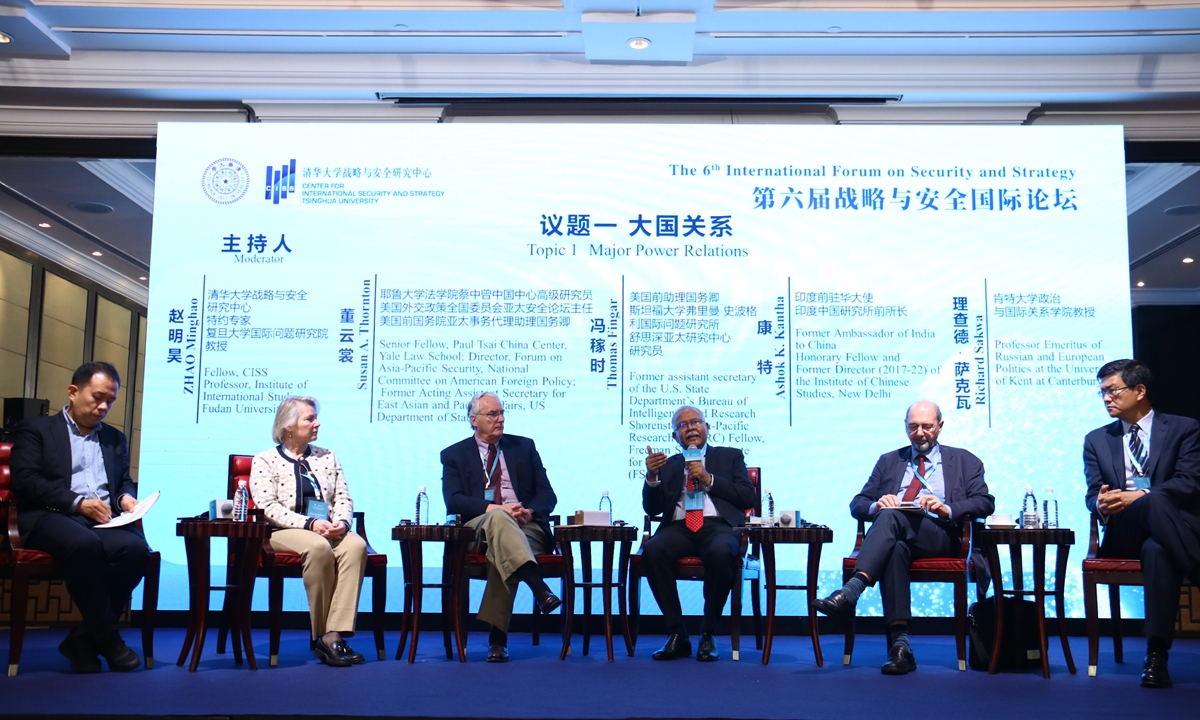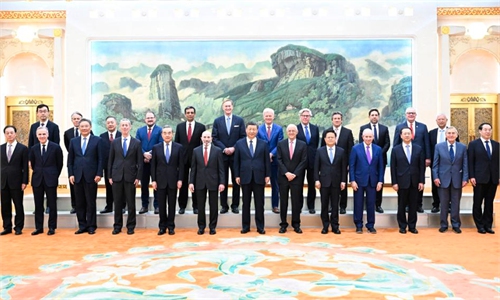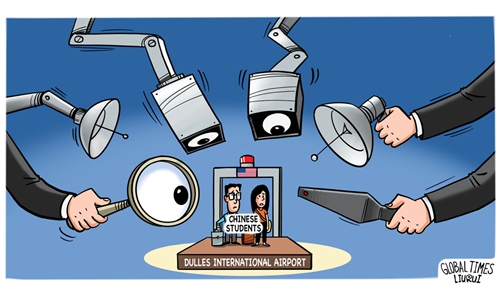
Scholars discuss at a panel discussion with topic about Major Power Relations at the 6th International Forum on Security and Strategy, which held by Center for International Security and Strategy (CISS) of Tsinghua University in Beijing on March 27, 2024. Photo: courtesy of CISS
Editor's note:The Center for International Security and Strategy (CISS) of Tsinghua University held the 6th International Forum on Security and Strategy themed "Seeking Consensus, Building Stability" from Tuesday to Wednesday. More than 60 guests, including former senior officials, diplomats and scholars, from China, the US, Russia, the UK, India, South Korea and other countries convened for discussions on international order, major power relations and hot spot issues around the globe.
The China-US relations are one of the hottest topics, with experts calling for the focus to be on cooperation rather than letting competition drive the whole bilateral ties, and stabilizing tensions by boosting communication and people-to-people exchanges. Hot issues including the Ukraine crisis and the Palestinian-Israeli conflict have also been discussed, with experts expressing hope for China to play a special role in contributing to the political solution of relevant crises.
Da Wei, director of CISS and a professor at Department of International Relations, Tsinghua University
The problem with China-US relations at present is that the public opinion environment in the US has been poisoned by some US politicians and media outlets hyping hostility against China. This can lead to wrong decision-making. The key issue is that if China follows this wrong direction to poison our public opinion environment by hyping extreme hostility against the US, it will also result in wrong decision-making on our side. China's policy on shaping public opinion environment needs to surpass that of the US.
While the US has taken actions to harm China, these actions have backfired on several occasions. Ultimately, it has been found that US hostile actions can have some impact on China, but the impact is limited, and China is also unable to harm the US significantly either. If we let hostility and confrontation dominate our policymaking, we would be merely focused on retaliation.
Retaliation is necessary and reasonable when we are harmed by others, but China's domestic policies on innovation and cutting-edge technologies are much more important than retaliating against the US. Retaliation cannot solve the specific problems in these areas. The danger of poisoning the public opinion environment goes beyond leading the two major powers toward conflict. It also involves closing the door to an open market for international cooperation and competition.
China's advantages in many fields, such as EVs (electric vehicles), are a result of opening-up and competition with companies that possess advanced technology from other countries. When the US is hostile toward law-abiding Chinese companies in the US, we should not retaliate in kind. Engaging in a tit-for-tat exchange against law-abiding US companies in China would cause China to lose its own advantages. Therefore, in order to shape the public opinion environment, we must not follow the US.
Susan A. Thornton, a former US senior diplomat and project director of Forum on Asia-Pacific Security at National Committee on American Foreign Policy
There are a lot of things that called themselves "news," but they are actually just people's opinions. We see a lot of opinions now. On social media we can see people giving their thoughts everywhere, and that's fine.
But that's not really that helpful because they need to have the facts about what's going on, what's really happening. That media has a responsibility. There's hard news and there's opinion news. The line between the two has become quite vague.
I don't like the phrase competition between nation states. That's not a good way to describe how to relate to one another. I would say that there is a danger in all of this that we engage with different kinds of competition. There's athletic competition when someone wins and someone loses. We hope with competition we could engage in the areas like climate change. That would be okay. But competition should not break us apart.
We were competing over some new energy technologies that were going to be able to replace fossil fuels and be deployed widely around the world and help us very quickly solve the carbon emissions problem. That would be fine.
For instance, in bio-technology spheres, which is completely globalized and integrated among scientists from all different countries, if you read scientific papers on new biological and medical discoveries, they are always written by experts from about 10 different countries, most often the US and China. If we start to break that apart, we will lose a lot of the products that we need to address some of the biggest challenges. What worries me is lose-lose competition.
Scott Kennedy, senior adviser and Trustee Chair in Chinese Business and Economics at the Center for Strategic and International Studies
The reason why we need to travel back and forth (between China and the US) is that we have to increase mutual understanding and cooperation.
There are global challenges that we need to face together, and there's certainly a lot of potential for win-win in many areas. We really need to improve communication because we have lots of differences. We have different interests, and different social and political systems. Sitting 8,000 miles away and looking at China through the computer screen isn't a way to learn about China, and it's not a way for the Chinese to sit somewhere here in China to look at the US.
I want the hardest-line members of the US Congress to come here (to China) and the hardest-line members in China's relevant authorities to go to the US. Those are the folks are most pessimistic and most worried about the relationship. Those are the ones that actually need to travel more than anybody else, but those are also the ones who are traveling the least.
I'm hopeful that we can restore connectivity so that there can be all sorts of people that travel in both directions, because we all need to hear from not only the people who will say nice things, but from the people that will say difficult things, even if we don't agree with them. Those are the conversations that we need to have.
Richard Sakwa, professor of Russian and European politics at the School of Politics and International Relations of the UK's University of Kent
China's engagement is important for the mediation of Ukraine crisis. Firstly, China issued "the 12-point peace plan" (formally titled "China's Position on the Political Settlement of the Ukraine Crisis") quite a long time ago. Obviously, it was not a detailed peace plan, but it was very important because it was a statement of principle, and that was important for relevant parties.
Secondly, China is also looking for a way to mediate, and of course, we know how China was able to mediate between Saudi Arabia and Iran. So on this one (the Russia-Ukraine conflict), it (China) could also be trusted by both sides.
The third point is somewhat more complicated. The Western powers do not accept China's mediation as they accused it of being "pro-Russia." The West is very keen to split "the Russia-China alignment," which is not an alliance, not a block, but an alignment. The West will do everything it can to poison the relationship between Moscow and Beijing. China is going to navigate through these very difficult waters.
However, "the Russia-China alignment" is one of the key axes for the international politics and I think it's not only very important but also necessary, perhaps this will not be very popular in the Western views, but it is a very necessary one.
Russia could have a huge military breakthrough in coming months, maybe this summer, and European countries are concerned and anticipate a defeat of Ukraine despite Ukrainian fighters are fearlessly fighting for their country. I think they should have a better and more inclusive peace order (to coexist with Russia).
This war is a European war, and it should have been avoided by Europe in the first place, so I could give a little slogan: This is a war made in Washington, nurtured in Kiev, and delivered by Moscow. And the tragedy is that Europe is nowhere to be seen. And maybe ended by China? We hope it could be ended by China.



